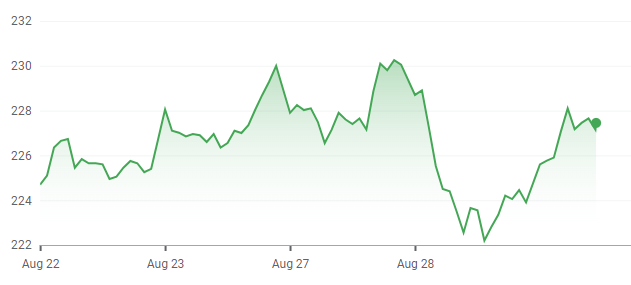Shares in UK-listed banks sold off yesterday after a Financial Times article speculated they could be hit by a windfall tax in the Autumn Budget. Bank shares have recovered somewhat already today but a cloud of uncertainty could potentially hang over them until chancellor Rachel Reeves spells out how she plans to plug a £22bn hole in the government’s finances on 30 October.
Dan Coatsworth, investment analyst at AJ Bell, said: “Keir Starmer and Reeves have made it perfectly clear they will leave no stone unturned in the search to find ways to boost public finances. That also means being creative with where they impose tax and it seems the banking sector could be in their sights. It’s about as easy a target as you can get.
“Banks have made big money from higher interest rates, profiting when the rest of the country has struggled through a cost-of-living crisis. If the oil and gas industry can be slapped with a windfall tax as a result of a spike in energy prices, so can the banks as a result of higher rates.”
Barclays’ share price over 5 days

Source: Google Finance
Mark Peden, co-manager of the Aegon Global Equity Income fund, agreed that banks are “an easy win for the government”. “Bashing the banks is not going to lose you any votes so I wouldn’t be surprised in the slightest if they go after the sector with windfall taxes.”
However, James Lowen, who manages the £1.7bn JOHCM UK Equity Income fund and holds Barclays, NatWest, HSBC and Standard Chartered, said banks are already paying higher taxes than other industries due to the bank levy so he thinks additional taxes are unlikely.
There has been speculation about a tax on reserve balances held at the Bank of England to offset the costs of quantitative easing, but Reeves and the governor of the Bank of England, Andrew Bailey, have already ruled this out because it would “meddle with how monetary policy is transitioned into the economy,” Lowen said. Therefore, if a new bank levy is introduced, he believes it would be a “more vanilla tax”.
He also disputed the assumption that banks have profited excessively from interest rate hikes. Standard Chartered and Barclays both have a 12% return on capital target, which is not supranormal, he observed.
Banks achieved “transitory” supranormal profits during the first half of last year but margins were eroded by competition and political pressure to pass on the benefits of interest rate rises to savers, he pointed out.
What the chancellor has not acknowledged in her budget deficit calculations is that the UK’s GDP is now much stronger than was expected at the time of the last Budget and the UK has the fastest growing economy amongst the ‘Group of Seven’ (G7) countries, Lowen continued.
“If you look at the GDP versus where the forecast was, tax receipts will be materially higher than expected so when that’s brought into the mix, the black hole that she talked about disappears fully. I think the fiscal position is better than is being articulated,” he argued.
Although Reeves has not ruled out increases to capital gains and inheritance tax, a new banking levy or reductions in pensions tax relief, Lowen believes only a few of these measures will need to be implemented.
Furthermore, increased taxation risks prompting banks with large international businesses such as Standard Chartered and HSBC to consider moving their listings abroad, he continued. That would be detrimental for the government’s drive to create a favourable environment for business and investment, and to encourage companies to list here.
“Standard Chartered is on 0.5x book [value], when its Asian equivalents quoted elsewhere are on 1.5-2x book, so that’s a UK discount. If it starts getting taxed more, that’s going to create those questions,” he said.
If additional taxes are introduced, Lowen said analysts are forecasting a 1% to 4% impact on net income. “I think if it did happen, it would be a contained and finite number that was already priced in yesterday, so it’s not something that’s going to lead to a 10%, 15% or 20% reduction in profitability,” he explained.
While uncertainty is never good for share prices, at least investors only have to wait two months for the Budget to bring clarity, Lowen added.
Peden thinks additional taxes would be a one-off event so “shouldn’t affect your modelling work on the valuation side”.
A more important consideration for investors is the interest rate cycle, which is currently “incredibly favourable” for banks and insurers, he said. “Banks like high interest rates because they charge more than they give you back in what you can earn from your deposits.”
If banks’ share prices fall further due to taxes being priced in ahead of the Budget, this could present provide a buying opportunity for investors, said Sam North, market analyst at investment platform eToro.
“In theory, the fundamentals of these companies would change slightly, but I still think their valuations are solid and the overall trend will continue to the upside despite a short blip,” he concluded.





